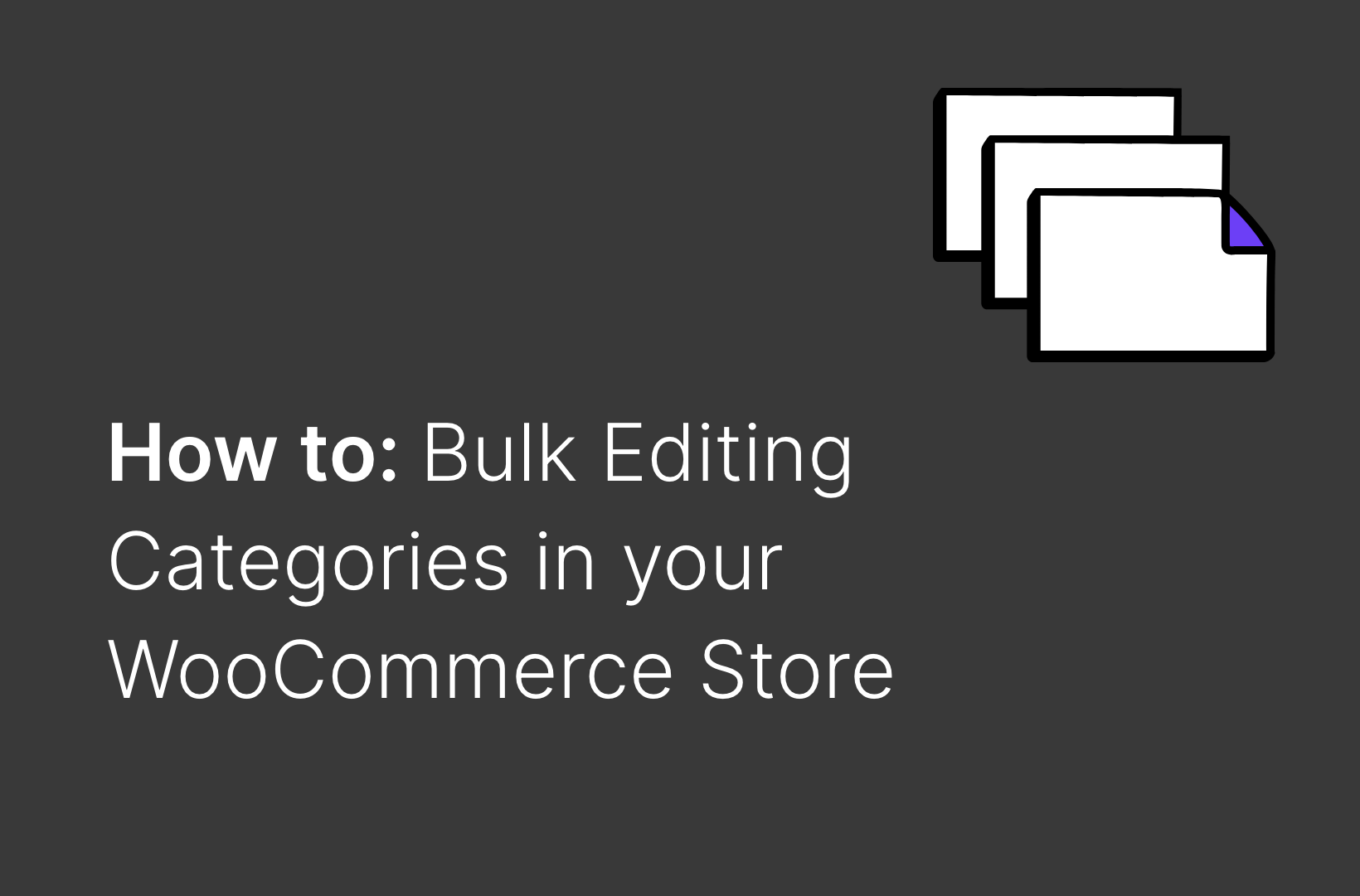Top Plugins for WooCommerce Multistore Management

Running multiple WooCommerce stores can significantly boost your eCommerce business, but it also comes with unique challenges. How do you manage inventory across different stores? What about syncing product data and orders? If you’re looking for efficient ways to handle these tasks, you’re in the right place.
In this article, we’ll explore the top WooCommerce multistore plugins that can streamline your operations and save you valuable time and resources. Whether you’re expanding to new markets, separating product lines, or simply scaling your business, these tools will help you manage multiple stores with ease.
Top WooCommerce multistore plugins
Managing multiple WooCommerce stores doesn’t have to be a headache. The right plugins can streamline your operations, saving you time and resources.
Here’s a curated list of top WooCommerce multistore plugins that can help you efficiently manage inventory, synchronize data, and simplify your workflow across all your stores:
| Plugin Name | Key Features | Best For | Pricing | User Rating | Active Installations |
| WooMultistore | – Central inventory management- Automatic stock synchronization – Order data centralization – Product publishing across stores | Businesses needing comprehensive multistore management with centralized control | $199/year | 4.5/5 | 10,000+ |
| Marketplace for WooCommerce | – Multi-vendor support – Drag-and-drop page builder – Beautiful pre-designed theme | Those looking to create a multi-vendor marketplace similar to Etsy or Amazon | $129/year | 4.3/5 | 5,000+ |
| Multistore Multivendor | – Easy product assignment to multiple stores – Separate WordPress setups for each store – Out-of-the-box functionality | Store owners wanting a simple solution for managing multiple front-end stores | $99/year | 4.2/5 | 3,000+ |
| WooCommerce Multisite Duplicator | – Easy product duplication across sites – Bulk product management – SKU and stock quantity management | Businesses looking to quickly replicate products across multiple stores | $79/year | 4.0/5 | 2,000+ |
| WP Global Cart for WooCommerce | – Unified marketplace for all stores – Global cart functionality – Consolidated checkout process – Global reporting features | Businesses aiming to create a seamless shopping experience across multiple stores | $149/year | 4.4/5 | 7,000+ |
Let’s dive into these multistore plugins in more detail.
1. Woo Multistore
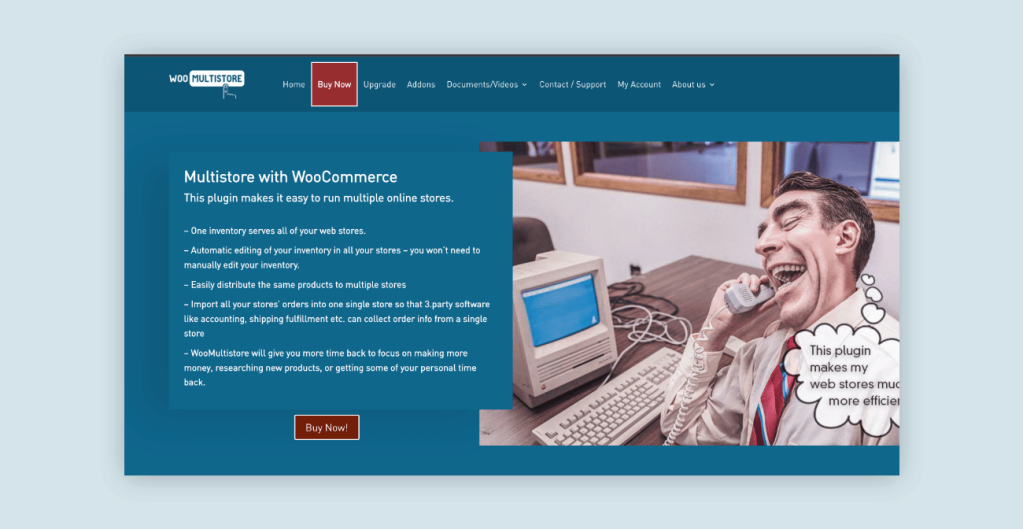
WooMultistore is a comprehensive solution designed to simplify the management of multiple WooCommerce stores. It offers a centralized approach to inventory, order management, and product publishing, making it an ideal choice for businesses looking to streamline their multistore operations.
Key features include:
- Central inventory management
- Automatic stock synchronization across stores
- Order data centralization
- Easy product publishing to multiple stores
- Bulk actions for efficient management
WooMultistore’s strength lies in its ability to consolidate your multistore operations into a single, manageable system. Centralizing inventory and order data significantly reduces the time and effort required to keep multiple stores in sync.
For businesses seeking a powerful, all-in-one solution to manage multiple WooCommerce stores effectively, Woo Multistore offers the features and centralization needed to streamline operations and support growth across multiple e-commerce fronts.
2. Marketplace for WooCommerce
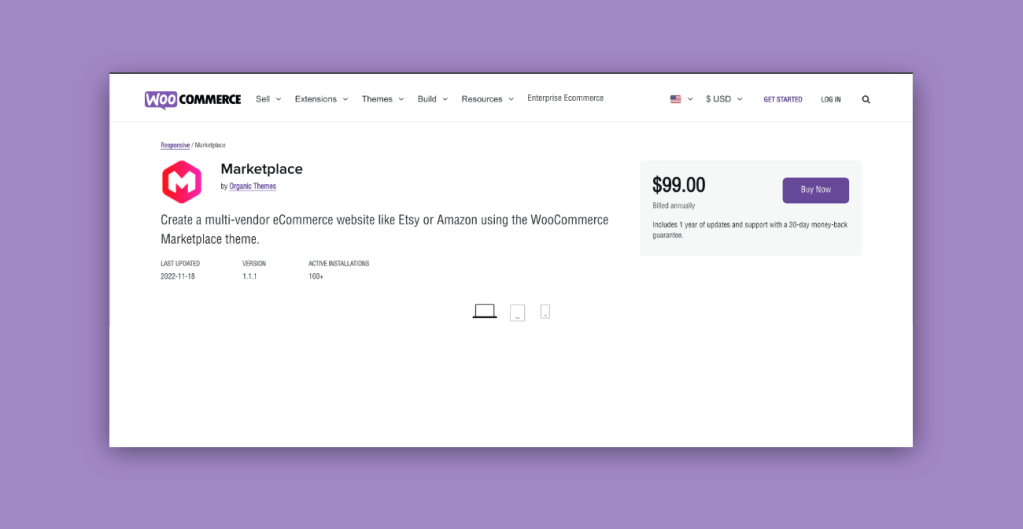
Marketplace for WooCommerce is a beautifully designed theme built with multistore vendors in mind. It’s a powerful solution for those looking to create multi-vendor eCommerce sites similar to popular platforms like Shopify, Etsy, or Amazon.
Key features include:
- Multi-vendor support
- Drag-and-drop page builder
- Beautiful pre-designed theme
- Admin page dashboard for all products
- Customizable product pages and shopping cart design
Marketplace for WooCommerce stands out for its ability to create stunning, functional multi-vendor marketplaces with ease. The drag-and-drop page builder allows for effortless customization, making it particularly appealing for those new to the multi-seller eCommerce world.Store owners can view all products from within the WooCommerce admin page dashboard, streamlining management processes. The theme’s flexibility extends to product pages and shopping cart designs, allowing for a tailored user experience that matches your brand.
3. Multistore Multivendor
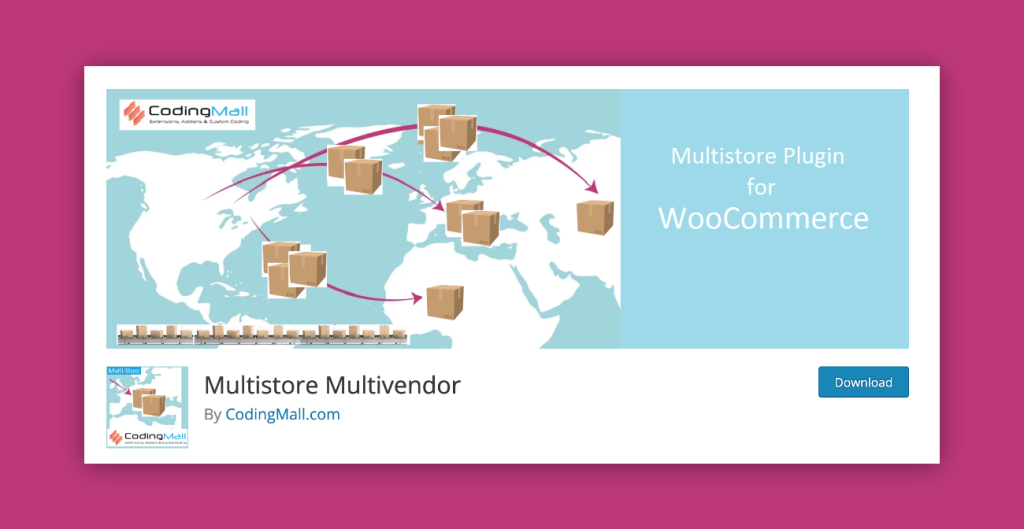
Multistore Multivendor is a plugin designed to simplify the process of running multiple front-end eCommerce stores. It offers a straightforward solution for managing various stores from a single WordPress installation.
Key features include:
- Easy product assignment to multiple stores
- Separate WordPress setups for each store
- Out-of-the-box functionality
- Central dashboard for all stores
- Customizable home pages for each store
After installation, you can quickly add your various eCommerce URLs and assign products to each store via the central dashboard. This streamlined process makes it ideal for store owners who want to manage multiple front-end stores without the complexity often associated with multistore setups.
For those seeking a no-fuss solution to expand their eCommerce presence across multiple stores, Multistore Multivendor provides the tools to get up and running quickly and efficiently.
4. WooCommerce Multisite Duplicator
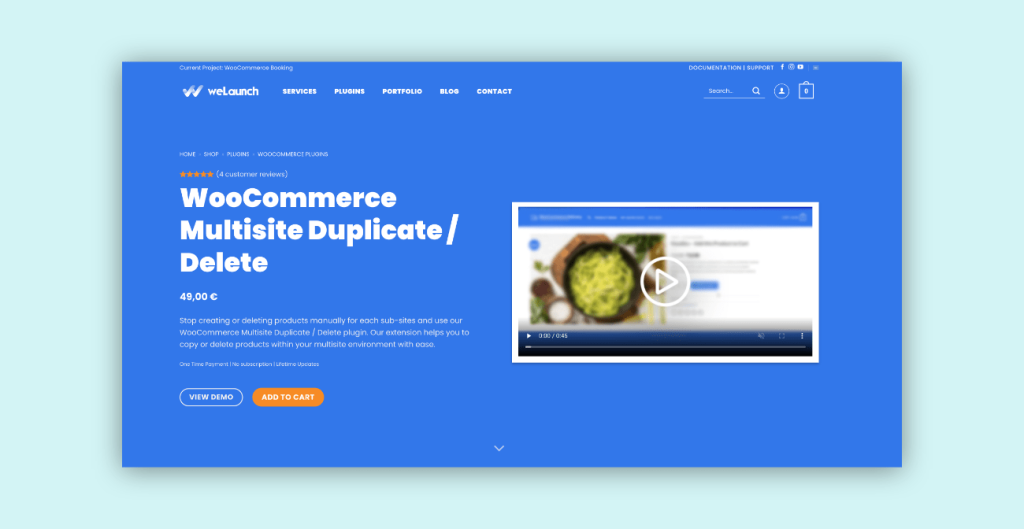
WooCommerce Multisite Duplicator is a plugin designed to streamline the process of replicating and managing products across multiple WooCommerce stores. It’s an excellent tool for businesses looking to expand their product lines or brands efficiently.
Key features include:
- Easy product duplication across sites
- Bulk product management
- SKU and stock quantity management
- Product image and text copying
- Centralized product updating
With WooCommerce Multisite Duplicator, you can easily copy products, including images and text, from one store to another, saving significant time and effort. For businesses looking to quickly scale their WooCommerce operations across multiple stores or brands, WooCommerce Multisite Duplicator offers a powerful set of tools to streamline product management and ensure consistency across your eCommerce ecosystem.
5. WP Global Cart for WooCommerce
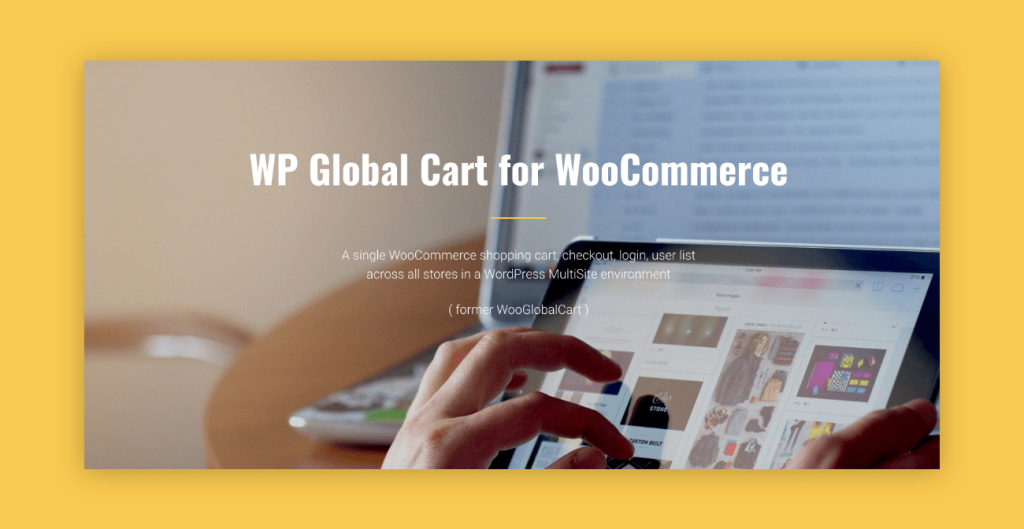
WP Global Cart for WooCommerce is a powerful plugin that allows store owners to unify all their stores into one unique marketplace. It’s designed to create a seamless shopping experience across multiple stores.
Key features include:
- Unified marketplace for all stores
- Global cart functionality
- Consolidated checkout process
- Global reporting features
- Easy setup with straightforward instructions
With this multistore plugin, customers can add products from any of your stores to a single cart and complete their purchase in one transaction, enhancing the user experience and potentially increasing sales.
For store owners looking to create a cohesive, user-friendly shopping experience across multiple WooCommerce stores, WP Global Cart for WooCommerce offers the tools to unify your marketplace and simplify both the customer journey and your own management processes.
Get help managing multiple WooCommerce stores with Saucal
While plugins can significantly streamline your WooCommerce multistore operations, managing multiple online stores often requires more than just the right tools. It demands strategic planning, ongoing optimization, and expert knowledge to truly unlock the potential of your e-commerce ecosystem.
This is where Saucal’s WooCommerce expertise comes into play. Our team of seasoned professionals can help you:
- Choose and implement the most suitable multistore setup for your business
- Customize solutions that align with your unique operational needs
- Provide ongoing support and optimization to ensure your stores perform at their best
- Develop strategies for scaling your multistore business effectively
Don’t let the complexities of managing multiple WooCommerce stores hold you back. Whether you’re just starting your multistore journey or looking to optimize your existing setup, Saucal is here to help you navigate the challenges and seize the opportunities of running a WooCommerce multistore.
Ready to take your WooCommerce multistore to the next level? Contact Saucal today.
FAQs
How do I set up a multistore on WooCommerce?
To set up a WooCommerce multistore, you have two main options:
- WordPress Multisite Install: This method allows you to create multiple stores using the same host and server. It’s generally more straightforward and streamlines many aspects of store management.
- Multiple Single-Site Installs: With this approach, each store has its own host and server. This can be beneficial if you want to keep operations completely separate.
For most users, the multistore installation is recommended due to its simplicity in managing login processes, inventory, taxes, shipping, and analytics across all stores.
What’s the difference between using a multistore plugin and setting up separate WooCommerce instances?
When managing multiple WooCommerce stores, you have several options, including using multistore plugins or setting up separate instances. To understand the difference, let’s look at the underlying approaches to multistore management.
Here’s what Saucal CTO, Matias Saggiorato, says about a technical approach to multistore for WooCommerce:
There are two main ways to handle multiple WooCommerce stores. You can use Multisite, which means one codebase and one database for multiple stores. Alternatively, you can set up multiple single-site instances, potentially with different codebases and separate databases for each store.
The choice between these approaches doesn’t hinge on technical reasons alone. It largely depends on your business needs and structure. For example, some companies separate their operations geographically. They might have distinct setups for North America and the EU, possibly with different sites for individual countries within each region. In contrast, others might prefer a single multisite setup with one site per operating region.
One key technical factor to consider is user account management. User and customer accounts are shared within a single instance, whether it’s a single site or a multisite setup. If you want customers to have separate accounts for different regions or brands, you’ll need to use separate site instances. This holds true even if your sites are identical across regions and share the same codebase.
Why set up a WooCommerce multistore?
There are several compelling reasons to create a WooCommerce multistore:
- Manage multiple sites within a single network, simplifying administration.
- Expand into international markets with different languages and currencies.
- Create separate stores for different product lines, improving targeting and SEO.
- Connect and manage multiple existing WooCommerce stores.
- Sync product data, inventory, and orders across all stores in real time.
- Easily export orders from specific stores or all stores.
- Set up multiple currencies, payment options, and languages for global selling.
How do I manage multiple WooCommerce stores?
Managing multiple WooCommerce stores can be efficiently done with the right approach and tools:
- Use a multistore plugin to establish a framework for your stores.
- Automate store management tasks like sales reporting, order fulfillment, and inventory management.
- Perform bulk actions across all stores, such as adjusting prices or adding new products.
- Utilize centralized data analysis tools to track revenue, sales, and other key metrics across all stores.
- Implement a centralized inventory management system to keep track of stock levels across all stores.
- Use features that help manage shipping and taxes for different regions or countries.
- Consider plugins that allow you to sell on other platforms like Amazon or eBay in addition to your WooCommerce stores.
While plugins can help with many aspects of multistore management, the complexity of running multiple stores often requires expert guidance. Professional services like those offered by Saucal can provide customized solutions, ongoing support, and strategic advice to ensure your multistore setup is optimized for success and scalability.

